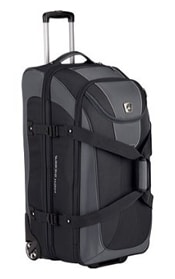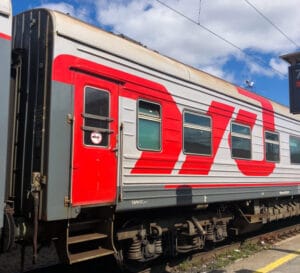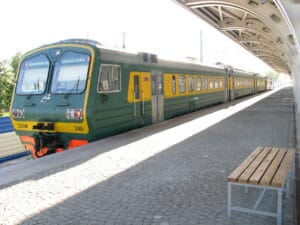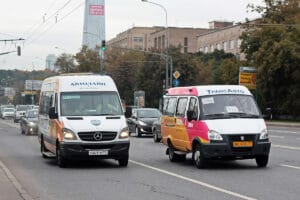Russia’s two major capitals are largely tourist friendly. Much of the metro systems and city navigation are available in English. Many restaurants have English-langauge menus and even waitstaff that speak a little English. However, not everywhere will English get you by in a Russian-speaking country.
This bilingual resource hopes to build students’ vocabulary skills and cultural knowledge in areas surrounding travel and transport within Russia to encourage additional domestic travel while abroad.
Documents in Russia
The following bilingual Russian MiniLesson is meant to build your vocabulary by providing Russian phrases within English text. Hover over the bold Russian to reveal its English translation.
Especially for Americans, who are used to travelling in our own country with just a and who can often travel to other countries with just our passports, the number of documents needed to stay legal in Russia can be quite bewildering.
Before you can plan your airport arrival, you’ll have to first get a Russian visa. If you’ll be coming on an SRAS program, SRAS will be helping you each step of the way.
is not an easy process.
First, you will need an . For students, this will come from a or registered school. Tourists usually get invitations from or . Businessmen might receive one from a . Researchers are usually invited by an .
Note that the is not a . It’s just the first step in the process of getting one. To get the visa, the invitation will be sent (usually electronically) to the consulate. You will then need to apply with your , , and . Depending on what type of visa you are applying for, you may need other documents. Students must present a , for instance.
It is interesting to note that much of the process Americans go through for a Russian visa is modeled on the process that Russians will go through for an American visa. Russia models its visa processes on the assumption that is fundamental in all relations.
differ depending on your type of visa. Student visas, for instance, can take as much as three months to fully process, including the issuance. Once you have your visa (which might arrive at the last minute), you’ll need to get a before departing.
Upon arrival in Russia, you are issued a by . This card, about the size of a passport page, is the official record of your entry to Russia. If you are arriving as a student, you will also need a , available at the airport, in order to check into the dorms.
At the dorms, you will need your to obtain your . Everyone in Russia is required to be registered at their address – again, the US technically has this as well, by requiring that everyone maintain a current address on their driver’s license. However, Russia enforces the requirement strongly while the US is lax.
You can only be registered at the place you are living. As an American you are required to have this issued within seven business days. If you travel and are registered at a hotel, you will need renew your registration once back at the dorms. Registration is a computerized system now and every new registration will cancel the previous.
Failure to register can result in fines which you will be required to pay before you can leave the country. Two or more of these infractions can also .
Thus, to , you will need to maintain at least four documents: visa, passport, migration card, and registration. These are interdependent on one another and each is important to making sure that your .
Airport Arrival to Russia
The following bilingual Russian MiniLesson is meant to build your vocabulary by providing Russian phrases within English text. Hover over the bold Russian to reveal its English translation.
After a traveler , he/she . Sometimes, it is hard to get an inexpensive airplane ticket to Russia shortly before holidays such as Christmas and New Year. It is cheaper to buy , but a traveler if his/her plans change.
Most Russian airports have signage and at least some staff that speak English. However, if you check in at a Russian airport, especially one outside of major cities, it can be useful to understand a few phrases which a check-in attendant usually asks, such as “”, “”, “” After a passenger and , a passenger can ask the attendant, “” to understand where to proceed to . The number is usually printed on the as well.
When a passenger ; his/her . The Russian security folks might ask, “” and/or “”. After checking, a security usually says, “”.
Finding your and is not difficult. Russian airports are very much like the airports in other countries. Further, they generally do not have terminals spread out, with a train connection, such as in JFK or Heathrow airports. However, sometimes an airport can announce, “”, and a passenger will have to find the new gate. A notice will likely appear at the first gate as well.

On a plane, before take-off, passengers hear the following announcement, “”. Before landing, it is announced, “”.
At , the agent might ask you, “?” This is important. You might be in Russia for many reasons, but the reason you give the agent should be the same as the purpose of your visa.
Watch for when the passport control agent gives you . They often slide it into your passport without saying anything. You will need to keep it safe for getting your and for other purposes later!
Nowadays, transfer to the city from any Moscow airport is simple. Many travelers take the new . Otherwise, all airports will be serviced by and , with taxi company desks inside airports, right next to the exits. If you take a taxi, make sure to use this desk and not take one of the taxis that will call out to you as exit into the hall. Those may not be official taxi drivers and may likely overcharge you.
Students interested to see what airport arrival looks like specifically for SRAS students in specific locations can see this group of resources.
Lost Luggage
The following bilingual Russian MiniLesson is meant to build your vocabulary by providing Russian phrases within English text. Hover over the bold Russian to reveal its English translation.
There are many potential problems you might experience when traveling, and one of the most common is . , you should . to begin the . If you traveled on different airlines on various , you should notify the airline that took you to your .

When filling out the lost luggage form, you will need for a where your luggage can be sent. Sometimes you will need to come back to the airport to your suitcase, but you may be asked for a , just in case. You will also need to know your . In addition, you should have a on the back of your that you received when you at your . Airline personnel will need the information on this tag to your luggage.
In your discussion with airline personnel, they will ask you to your lost baggage. For instance, do you have a or a , is your suitcase , and is it ? You should also describe the color, and whether it has any , such as or . You may also be asked about the .
Each airline has its own specific policy towards bag searches. With Aeroflot, for example, the search for lost luggage . If the luggage is not found within 21 days, will be made in accordance to the airline’s policies.
It helps if you have a on your luggage when you travel. This way, you can be sure that no one will take your bag, since the majority of suitcases are black and look very similar.
It’s also possible that you forgot something on board the aircraft when you , which you didn’t realize until you already left the airplane. In this case, there is usually a phone number you can call for . For Aeroflot, this number is +7 (499) 500-6552. You should be able to find the number for other airlines by checking their site.
Train Travel in Russia
The following bilingual Russian MiniLesson is meant to build your vocabulary by providing Russian phrases within English text. Hover over the bold Russian to reveal its English translation.
Trains are the most popular form of travel in Russia. Due to Russia’s harsh weather, railways are much better developed than the roads, which are more difficult to maintain. While air travel is quickly becoming more developed in Russia, and now competes effectively with train travel in terms of prices, trains are a part of Russian culture and will be for a long time.

If you decide to take the train, the first thing you need is . If you will be taking a multi-stop journey, you might look at purchasing your tickets from an online service such as this one. However, it’s generally easiest and cheapest to buy a ticket in person at the train station. To do so, first find the train station you need. In Moscow, for instance, there are . Once inside the train station, find the . Keep in mind that there are two sets of ticket offices in every station: one is labeled and the other is . Commuter trains allow you to reach destinations up to about an hour from the city.
For long distance tickets, you should plan to wait in line for about 15-40 minutes (like we said, it’s a popular mode of travel). If you wanted to order one second class ticket to Kiev at Kievskaya Vokzal in Moscow, you would tell the there: . The cashier might reply, . So long as you are able to climb a short ladder, however, this shouldn’t concern you and you can accept the top bunk. If you ordered a ticket, the cashier might say . The side spaces in third class are very small and it can be very difficult to sleep there. If you will be travelling for any length of time, you will want to take at least a second class ticket.
If you are unhappy with the available seats, you can ask If there are other trains heading for that same destination (at some other time) that day, the cashier will tell you. On the ticket you bought, you will see your , and . For more about how to read your ticket, check our Guide to Russia.
The procedure of entering the train is simple: you show the (who is usually female. If male, the title is “проводник”) your ticket and passport. They are very strict about passports, so don’t forget yours. If you don’t have it, you will have about as much chance of getting on the train as if you showed up without a ticket.
After the passengers take their seats, and usually after the train has begun moving, the attendant will collect the tickets. She asks, . Her second question, if you will be travelling overnight, is usually: As a rule, includes two sheets, a pillow case, and a small towel. Renting this will set you back about 50-100 rubles (2-4 US dollars). Blankets are often in the storage compartment above the door of second-class cabins. If not, you can ask the attendant, who resides at the front of your wagon, for a blanket. The attendant also generally has coffee and tea continually available – purchasing a cup costs about 5-10 rubles.
Any problems that you may have on the trip can be taken to the проводница, you can address the , who is usually located in the , which is usually at the very front of the train. There are often security forces on any train as well.
The of the train is small and not very comfortable as it almost never has and for this reason passengers often carry toilet tissue with them.
If you will be traveling several hours, you will probably want to buy some food at train stops. If you will be getting off the train, you should always ask the attendant If the train will be at the station a very short amount of time, you might not want to risk getting off. If you are not on by the time the train leaves, you will be left behind.
Commuter Rail
The following bilingual Russian MiniLesson is meant to build your vocabulary by providing Russian phrases within English text. Hover over the bold Russian to reveal its English translation.

Commuter trains have several names in Russian. The most common name for one is , but there are also a few slang names, such as элька and собака because
Russians living near big cities often use the elektrichka to commute to work, to go shopping, or to reach wider entertainment or cultural opportunities. In the Moscow area, some people commute as far as 100-150 kilometers, spending up to six hours on the train in total every day. For these people, is an integral part of their lives: they often have breakfast and supper during the trip, and even sometimes drink beer or vodka and chat with fellow travellers.
The elektrichka is different from a regular long-distance passenger train. While , . . Meanwhile, . An elektrichka has 5-8 or, at most, 12 carriages, while a typically has at least 20 carriages. Also, .
Tickets for the elektrichka are sold at , while tickets for long-distance trains are sold at . Most Russian train stations have both – often in different places in the station, and usually clearly labeled with these names. . You must tell the ticket vendor exactly where you plan to go and often on what train you plan to go on.
In Moscow, area passengers have to to However, some people find ways to by or . You must use your ticket when entering and when leaving to operate the turnstile.
A passenger can frequently see . Ticket collectors, mainly , enter the train, requesting, or and then . They can also to those who do not have a ticket and are ready to pay. If someone says to a ticket collector, that person will either have to buy a ticket or conductors can . However, it also happens that many conductors will accept some small payment in return for not making a buy a ticket or leave the train. For this reason, the work of a ticket collector is considered to be .
It is hard to rest on the elektrichka, because the seats are not so comfortable, the trains are often crowded, and : . They sell many different items, from toys to food to books, and enter the carriage every few minutes. Also, bother passengers by asking for money, saying, for example , and
There are many types of people who use the elektrichka – , , , , and even
There are many jokes about the elektrichka, such as:
Another joke is related to the fact that the elektricka is often very crowded:
The following bilingual Russian MiniLesson is meant to build your vocabulary by providing Russian phrases within English text. Hover over the bold Russian to reveal its English translation.
The marshrutka is often used to travel to locations just outside of major cities. The word маршрутка is a shortened form of . These are minivans or minibuses that usually duplicate routes used by public buses – and usually display the same numbers.

In smaller towns, a маршрутка is often because buses run until 9 or 10 pm, while маршрутки usually run later. Everywhere in Russia, маршрутки are popular because they can better in traffic and are thus faster than busses, trams, or trolleys.
Some маршрутки are very convenient for travelers, allowing them to A passenger should , by saying, for example, , or . A passenger should state his/her , but ; you must make sure that the driver can hear you but try not to disturb (or frighten!) the other passengers as that is considered rude. A more vernacular way to request a stop is to say, or, one can also use shortened forms such as simply and the driver will understand.
If one is unsure what маршрутка to take, one can try asking other people waiting at the bus stop a question like ” and the answer will usually be a маршрутка number and a bus stop to ask for. Or, one can ask the driver of the маршрутка a question like If one is unsure where that is, if the driver answers that question in the affirmative, one can ask in advance, for instance, .
in a маршрутка is right behind the driver; the passenger sitting there will have to . Other passengers pass money to him/her, asking their neighbors, If one does not have the exact amount, he/she clarifies, . If a passenger has a large bill, such as a 1,000 ruble-note, he/she can ask the driver first,
Sometimes the маршрутка is crowded, and to make sure that there is a seat left, one can ask the passengers or the driver before entering, . If all the seats are taken, one can ask the driver, A маршрутка should be equipped with handrails to accommodate standing passengers. If there are no handrails, the driver may ask you to step out and wait for the next маршрутка.
One should be aware that some маршрутка now have These occur, as a rule, in foreign-made vehicles. In Russian minibuses, people close and open the doors by hand. The person sitting nearest the door should make an effort to open it for departing passengers.
There are many jokes about who must have a unique ability to multitask – . Also, there are many Russian jokes on the Internet about people making phone calls in маршрутка and revealing intimate details of their lives. Long or loud phone calls are also against common etiquette in a маршрутка – although many will still have them.
Housing and Registration in Russia
The following bilingual Russian MiniLesson is meant to build your vocabulary by providing Russian phrases within English text. Hover over the bold Russian to reveal its English translation.
You should make sure that any housing option you chose in Russia will be able to register you upon arrival. Americans are required to register thier visas within seven business days of arrival. Hotels can be expected to do this automatically. Hostels and Airbnb locations will sometimes do it automatically, sometimes for an additional charge, and sometimes will refuse to do it (although they are legally obligated to do register any tenant renting housing from them).
Because of registration issues, if you will be staying in Russia for only a few days, желательно останавливаться в гостинице. Finding and reserving an affordable hotel room has been made quite easy with the advent of rental sites like booking.com, which is Russia’s most used booking service.
If you’ll be staying longer, especially as a researcher or student, or if you are just determined to use Airbnb, we recommend that you read this resource on our sister site, GeoHistory. It will explain the legalities of renting and registration in Russia in greater detail.
If you have to in a Russian provincial town, you might stay in . As a rule, it is a , constructed sometime between 1950-1980,, with and . Inside there is : . There is an , and the is often . Sometimes to the hotel.
While some of these museum piece hotels still exist, there are also many hotels that have been purchased and updated by private entrepreneurs – both in major cities and outside of them. Booking.com will make it fairly easy to see what you will be renting in advance.
Looking at thigns historically, in the Soviet epoch, provincial hotels or , but in the depths of the country, there were not many such travelers, and provincial hotels often . Meanwhile, the hotels in bigger cities always had on the reception desk.
A frequent compaint about hotels in Russia, especially smaller ones, is that it can sometimes be hard . However, service is not always bad. Often, the staff in a provincial hotel can give you a hand and explain the directions, as well as to help settle some problems you might have in a new place.
Many popular also have which provide .
Here are some basic phrases for checking in and staying in a hotel in Russia:
Checking in:
Making a reservation:
Staying over:




